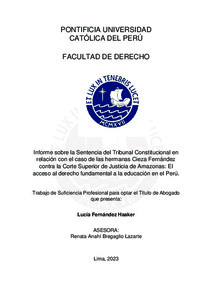| dc.contributor.advisor | Bregaglio Lazarte, Renata Anahí | |
| dc.contributor.author | Fernández Haaker, Lucía | |
| dc.date.accessioned | 2023-11-08T20:36:00Z | |
| dc.date.available | 2023-11-08T20:36:00Z | |
| dc.date.created | 2023 | |
| dc.date.issued | 2023-11-08 | |
| dc.identifier.uri | http://hdl.handle.net/20.500.12404/26378 | |
| dc.description.abstract | El presente informe trata sobre el derecho fundamental a la educación en una
zona rural de la selva del Perú. Es un caso muy importante porque pone en
evidencia la precariedad del servicio educativo en el Perú y la postura del
Tribunal Constitucional frente a la dificultad para acceder al ejercicio de un
derecho fundamental que el Estado Peruano no está en capacidad de garantizar.
El problema principal del caso consiste en evidenciar si se vulneró o no el
derecho a la educación de las demandantes (dos hermanas con 18 y 19 años)
al no contarse con centros educativos idóneos en la zona rural en la que vivían
y, al impedírseles la matrícula en un centro de educación básica regular por ser
mayores de edad. El TC declaró fundada la demanda señalando que las leyes
deben interpretarse a la luz de la Constitución y no a la inversa de modo que, si
bien la Ley General de Educación, Ley 28044 y, la Directiva 014-2012-
MINEDU/VMGP “Normas y orientaciones para el desarrollo del año escolar 2013
en la educación básica” establecían los criterios para el acceso a .los centros
educativos de educación básica regular y de educación básica alternativa, dichas
normas debían aplicarse siguiendo los lineamientos constitucionales que regulan
los derechos fundamentales y no al revés. Además, la sentencia declaro el
estado de cosas inconstitucional. El derecho a la educación es un derecho
fundamental regulado -entre otros- en los artículos 13, 14,16 y 17 de la
Constitución y en el Perú, además, los derechos humanos se interpretan, de
acuerdo con la Cuarta Disposición Final y Transitoria, siguiendo los tratados
internacionales como la Declaración Universal de Derechos Humanos y el Pacto
Internacional de Derechos Económicos, Sociales y Culturales. | es_ES |
| dc.description.abstract | This report deals with the fundamental right to education in a rural jungle area of
Peru. It is a very important case because it highlights the precariousness of the
educational service in our country and the position of the Constitutional Court
regarding the poor access this fundamental right has and that the Peruvian
Goverment cannot guarantee. The main problem in the case is whether or not the
educational right of the applicants (two sisters aged 18 and 19) was violated by
the lack of suitable educational centres in the rural area in which they lived and
by preventing them from enrolling in a regular basic education centre because
they didnt have the legal age. The Constitutional Court declares the claim to be
well founded on the grounds that the laws must be interpreted following the
Constitution and not vice versa, so that, evenlthough the General Educational
Law establishes criteria for access to regular basic education and alternative
basic education centers, these norms must be applied following the constitutional
guidelines that regulate fundamental rights and not vice versa. The Courts also
declared the unconstitutional state of affairs. The educational right is a
fundamental right regulated -among others- in articles 13, 14, 16 and 17 of the
Constitution and in Peru, in addition, human rights are interpreted, in accordance
with the Fourth Final and Transitory Provision, following international treaties
such as the Universal Declaration of Human Rights and the International
Covenant on Economic Social and Cultural Rights. | es_ES |
| dc.language.iso | spa | es_ES |
| dc.publisher | Pontificia Universidad Católica del Perú | es_ES |
| dc.rights | info:eu-repo/semantics/openAccess | es_ES |
| dc.rights.uri | http://creativecommons.org/licenses/by-sa/2.5/pe/ | * |
| dc.subject | Derecho a la educación | es_ES |
| dc.subject | Derechos fundamentales--Perú | es_ES |
| dc.subject | Derechos humanos--Perú | es_ES |
| dc.subject | Igualdad de oportunidades en educación | es_ES |
| dc.title | Informe sobre la Sentencia del Tribunal Constitucional en relación con el caso de las hermanas Cieza Fernández contra la Corte Superior de Justicia de Amazonas: El acceso al derecho fundamental a la educación en el Perú | es_ES |
| dc.type | info:eu-repo/semantics/bachelorThesis | es_ES |
| thesis.degree.name | Abogado | es_ES |
| thesis.degree.level | Título Profesional | es_ES |
| thesis.degree.grantor | Pontificia Universidad Católica del Perú. Facultad de Derecho. | es_ES |
| thesis.degree.discipline | Derecho | es_ES |
| renati.advisor.dni | 40284989 | |
| renati.advisor.orcid | https://orcid.org/0000-0003-4306-2511 | es_ES |
| renati.author.dni | 10544799 | |
| renati.discipline | 215106 | es_ES |
| renati.juror | Ancí Paredes, Noemi | es_ES |
| renati.juror | Constantino Caycho, Renato Antonio | es_ES |
| renati.level | https://purl.org/pe-repo/renati/level#tituloProfesional | es_ES |
| renati.type | https://purl.org/pe-repo/renati/type#trabajoDeSuficienciaProfesional | es_ES |
| dc.publisher.country | PE | es_ES |
| dc.subject.ocde | https://purl.org/pe-repo/ocde/ford#5.05.01 | es_ES |







